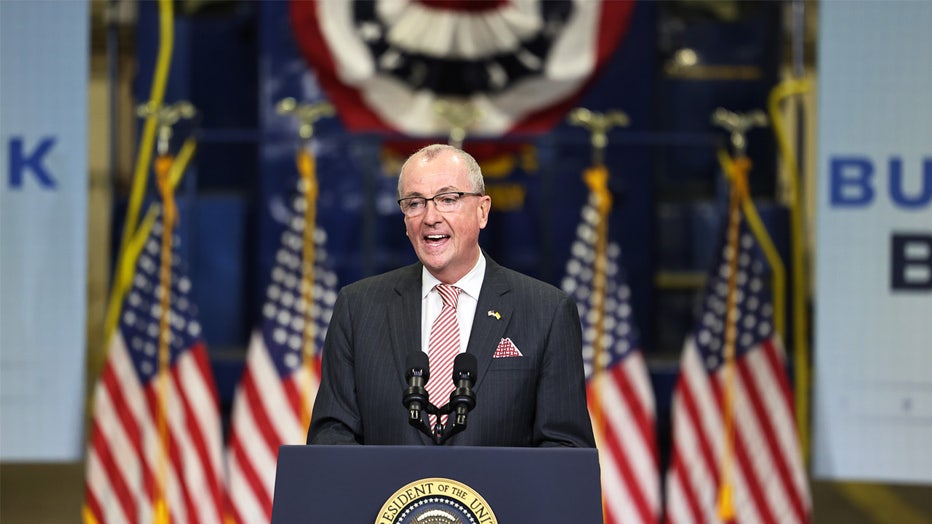NJ failed vets in state-run homes hit by COVID-19: federal report
NEW JERSEY - Widespread dysfunction at two of New Jersey's state-run veterans homes left them unprepared to protect residents during the COVID-19 pandemic and still persists, a scathing report by the U.S Justice Department found Thursday.
The 43-page document paints a disturbing picture of failures at the homes in Menlo Park and Paramus, where dozens of deaths occurred early in the outbreak.
It said poor communication, lack of staff competency and other issues led to the coronavirus spreading "virtually unchecked throughout the facilities."
What did the federal report find?
Among the findings:
- The homes failed to group residents into cohorts according to their exposure to COVID-19, resulting in the commingling of infected and uninfected people.
- They didn't properly use personal protective gear.
- They failed to communicate effectively internally and did not maintain improvements achieved after the U.S. Veterans Affairs department came in to help, among other issues.
"Even by the standards of the pandemic’s difficult early days, the facilities were unprepared to keep their residents safe," the report said.
The report goes further, saying infection control problems have continued to the present, including during the Omicron outbreaks in 2021 and 2022. The homes are not training their staff properly or monitoring compliance with infection control protocols, among other failures, the report said.
"These failures are substantial departures from generally accepted standards of care in long-term care facilities and inhibit the Veterans Homes’ ability to stop the virus from spreading inside the facilities, creating a serious risk of harm," it said.
The facilities are operated by the state’s Department of Military and Veterans Affairs, each with just over 300 beds. The state reached a $53 million agreement in 2021 to settle claims that it was negligent and contributed to more than 100 deaths at the two VA homes.
Gov. Phil Murphy called the report a "deeply disturbing reminder" that the treatment veterans received was unacceptable. He said his administration made policy changes to improve conditions, including hiring private management for the two homes.

Gov. Phil Murphy speaks. (Photo by Michael M. Santiago/Getty Images)
"However, it is clear that we have significantly more work to do," he said in a statement.
Murphy’s administration came under harsh criticism for his handling of the pandemic in veterans homes, with Republicans calling for investigations into his management of the outbreak.
The report, noting the state's attempts to remedy the situation, criticized it for what it called the lack of independent oversight.
"The past several years indicate that the Veterans Homes, even with the assistance of paid, outside consultants, cannot implement systematic changes to end the ongoing violations of the constitutional rights of the individuals in their care without external accountability," the report said.
Paul da Costa, an attorney representing many of the families in the settlement with the state, said he's spoken to some of his clients, and while they feel vindicated by the report, they're also "extremely disappointed."
The Justice Department also described the facilities' cooperation with its investigation as "inadequate."
While investigators were talking to witnesses, they were followed by state staff attorneys and facilities managers, the report noted, and officials discouraged staff from talking to the Justice Department. After the first visit, the CEO of the Paramus site told department heads that DOJ could shut them down and they should be mindful of what they say.
The governor has previously pledged a comprehensive study into his administration’s handling of the virus, launching a review last year. A report was expected by the end of this year. Murphy was reelected in 2021.
The report included a particularly tragic account of a former Marine, identified as Resident C.
Who was Resident C?
Early in 2020, he was alert, talked to his family every day and led an art class. He was known to be polite and sociable. On April 4, 2020, soon after the first cases were identified in the state, his roommate was hospitalized for potentially having COVID-19. The roommate died two days later after testing positive.
"There is no evidence that Menlo Park monitored Resident C for COVID, even as his condition declined in the days after his roommate’s positive test," the report said.
Facility staff took Resident C's scooter from him on April 5, without explanation, according to the report, then shut the door to his room, leaving him unable to reach his buzzer to call for help or his cell phone. A day later he was noted to be confused and was administered antibiotics for pneumonia. The same day, he was yelling for help and soon developed a fever. He died April 16 of that year, the report said, with no mention of COVID-19 in his chart.
"Resident C’s family later asked the facility if Resident C’s roommate had COVID; they were told ‘no,’" the report said.
The report found the number of deaths during the early months of the outbreak was much higher than the numbers publicly disclosed.
In April 2020 alone, 98 Menlo Park residents and 92 Paramus residents died of all causes, roughly equal to the number of people who die in a year at the homes.
As of July 2020, the state published data showing 81 deaths at Paramus and 65 at Menlo Park. But the actual number of residents who died of COVID-19 was much higher, the report said. The reported deaths were based on the cause of death listed on a death certificate, but because COVID-19 tests were not readily available early in the pandemic, residents often died without a positive test. Universal testing didn't start until April 20, 2020.
"It is clear that the number of deaths during COVID’s early months was substantially higher than the numbers publicly disclosed, and substantially higher than at other facilities," the report found.
The report is based on interviews with dozens of witnesses, current and former staff, family members of residents, visits to the facilities and the review of thousands of documents.

